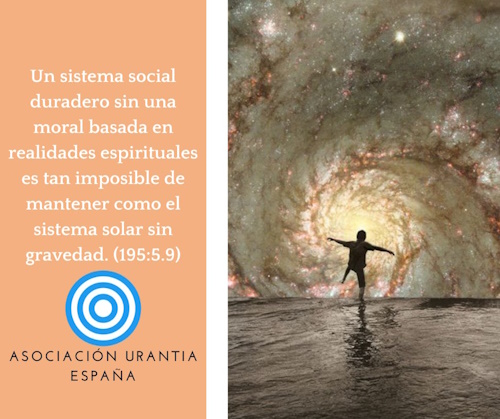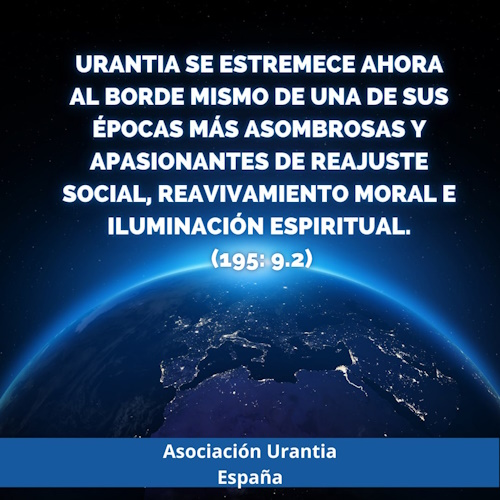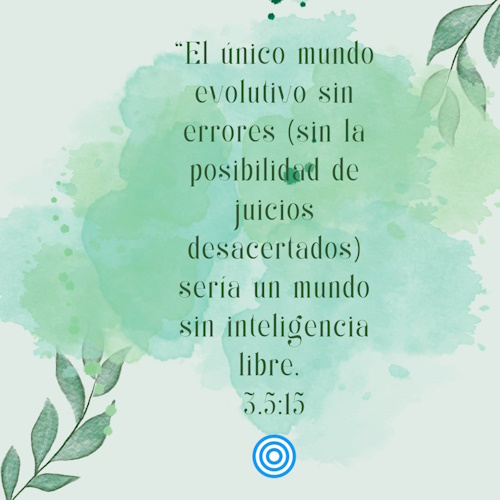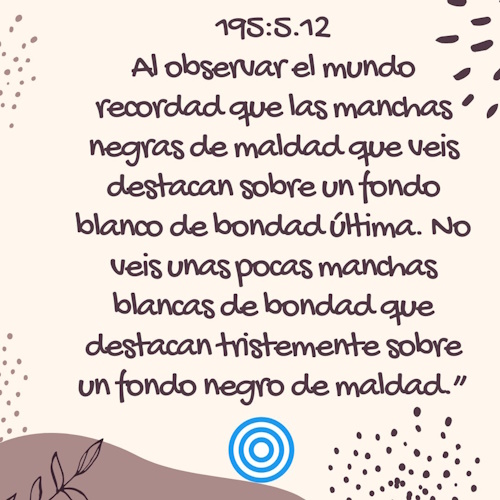© 2023 María José Sánchez Santamaría
© 2023 Urantia Association of Spain
| Luz y Vida — February 2023 — Newsletter | Luz y Vida — February 2023 — Index | Urantia Reflections: Awakening to a New Consciousness (Part One) |
¶ The look

“A long time ago, there was a man who decided to move to a new town. Wondering if he would like his new home, he went to consult the local Zen master:
Master, do you think I would like this new village? Nice people?
The Zen master asked:
—What were the people like in the town where you come from?
—They were nasty, rabid, and greedy. Some ungrateful gossips who only know how to live their lives deceiving or mistreating others —said the newcomer.
—That’s exactly the kind of people we have in this town, —said the Zen master.
Another newcomer to the village visited the teacher and asked the same question. Again the Zen master asked:
—What were the people like in the town where you come from?
Respectful and affectionate, they are wonderful and grateful people who live in harmony with each other, —he replied.
—That’s exactly the kind of people we have in this town, said the Zen master.”
How reality changes according to which eyes we see it with, right?
And we, readers of The Urantia Book, with what eyes do we look at reality? Do we have God’s gaze, his focus, his approach to reality? A look that makes present what we have right in front of us, without evasions or screens?
“Look your eyes forward, and let your gaze be fixed on what is in front of you.” Proverbs 4:25
What is in front of you is a panorama of a suffering planet, with a humanity in pain, a humanity that is very unconscious.
The Chilean philosopher Gastón Soublette tells us that we have turned a marvelous creation into a hell for many people, and we make our life as if it were something reasonable or normal. For example, is it normal that we cannot drink the water from our rivers? Is this really adequate and acceptable? We confuse the normal with the frequent. Two different things, because there are frequent things that are deeply abnormal and vice versa: there are phenomena or realities that are rare but are normal or adequate for humanity. For example: let us think of the small number of people who read and practice the teachings of The Urantia Book, but who carry out a healing and appropriate work with the rest of human beings.
The truth is that we live in historical moments, unique due to the depth and extent of the phenomena. We live in a “dystopian” society, the opposite of a “utopian society.” UTOPIA would be an exemplary, fulfilled, conscious, happy humanity, and DYSTOPIA is the opposite: an alienated society, which suffers, with injustices and wars, and where life is not revered.
The word dystopia is relatively new in the dictionary, but not its opposite utopia, which is several centuries old, since Thomas More wrote the book of the same name. Dystopia is a word from the 20th century and in fact it began to be used as a literary genre, as it alluded to fictional stories that spoke of a suffering and alienated humanity.
There are two fundamental dystopian works: A Brave New World and 1984. The first tells us about a materialistic society, entertaining and distracted by nonsense, with a system that encourages drugs and gambling. In 1984, Orwell tells us about a system that uses technology to control and monitor people, a system that advocates massive disinformation and where there is only one official truth.
History seems to have made a curious mix of both dystopias: we live in a society where technology is used to control or monitor us; our mind is absorbed and entertained, entertained for hours with the screen and where the information we naively send to social networks is used by large multinational corporations (“The Social Dilemma” is a documentary that clearly shows this).
Our gaze, therefore, can observe a panorama of a planet in crisis and chaos. At least on your first observation.
The truth is that this disturbing reality is already announced. We read about this great planetary crisis in The Urantia Book:

We are talking about a global system in crisis that will not last over time, because it lacks spiritual support:
A lasting social system without morality based on spiritual realities is as impossible to maintain as the solar system without gravity. (UB 195:5.9)
No social system or political regime that denies the reality of God can contribute constructively and lastingly to the progress of human civilization. (UB 195:10.7)
But you should be wise regarding the ripening of an age; you should be alert to discern the signs of the times. You know when the fig tree shows its tender branches and puts forth its leaves that summer is near. Likewise, when the world has passed through the long winter of material-mindedness and you discern the coming of the spiritual springtime of a new dispensation, should you know that the summertime of a new visitation draws near. UB 176:2.6
As the writer Emilio Carrillo said in a recent conference: currently, this society has contributed everything it had to contribute; the “suit” of this humanity is becoming too tight for us. Don’t you feel that this system of things is getting too small for us? Aren’t you uncomfortable? And it is that many people have grown, matured, and we are no longer convinced by the current society.
We can also use the simile of the house: conceive of the sociopolitical and economic system as a house in ruins, but a structural ruin, from the foundations (we are not talking about damage to a wall or a window). And if we live in this house in ruins, let’s not spend energy reforming it or fighting with it, since fixing a wall or a roof does not contribute anything. What you have to do is leave this house and make a new one, forge a new humanity, another way of existing.
Do you know the fable of the frog and the pot of boiling water?
“A frog jumped into a pot of boiling water one day. He immediately jumped to get out and get away from her. His instincts told him that he had to save himself and he quickly jumped out of the pot.”
“Another day, that same pot was filled with cold water. A frog jumped in and swam quietly. I was happy in that makeshift pool.”
“What the frog did not know is that the water was heating up little by little. So after a short time the cold water became warm, but the frog got used to it. There it was still, swimming placidly. However, little by little the water rose in temperature. So much so that it became so hot that the frog died of heat. She hadn’t noticed, however, as the heat gradually increased and she was getting used to it.”
Currently, the shocks that surround us (what if a war in Europe, if prices rise…), these “heats” that life offers us now, can make us see the need to jump, change from a superficial, entertaining life , material, to something transcendent. This tremendous dystopia that surrounds us (disease, famine, wars, “dark nights” that we live now), everything is as if we are living or splashing in a boiling pot. This discomfort can help us jump, grow and improve consciousness.

The uncertainties of life and the vicissitudes of existence do not in any manner contradict the concept of the universal sovereignty of God. All evolutionary creature life is beset by certain inevitabilities. Consider the following:
“1. Is *courage—*strength of character—desirable? Then must man be reared in an environment which necessitates grappling with hardships and reacting to disappointments.”
“2. Is *altruism—*service of one’s fellows—desirable? Then must life experience provide for encountering situations of social inequality.”
“3. Is *hope—*the grandeur of trust—desirable? Then human existence must constantly be confronted with insecurities and recurrent uncertainties.”
“4. Is *faith—*the supreme assertion of human thought—desirable? Then must the mind of man find itself in that troublesome predicament where it ever knows less than it can believe.”
“5. Is the love of truth and the willingness to go wherever it leads, desirable? Then must man grow up in a world where error is present and falsehood always possible.”
“6. Is *idealism—*the approaching concept of the divine—desirable? Then must man struggle in an environment of relative goodness and beauty, surroundings stimulative of the irrepressible reach for better things.”
“7. Is *loyalty—*devotion to highest duty—desirable? Then must man carry on amid the possibilities of betrayal and desertion. The valor of devotion to duty consists in the implied danger of default.”
“8. Is *unselfishness—*the spirit of self-forgetfulness—desirable? Then must mortal man live face to face with the incessant clamoring of an inescapable self for recognition and honor. Man could not dynamically choose the divine life if there were no self-life to forsake. Man could never lay saving hold on righteousness if there were no potential evil to exalt and differentiate the good by contrast.”
“9. Is *pleasure—*the satisfaction of happiness—desirable? Then must man live in a world where the alternative of pain and the likelihood of suffering are ever-present experiential possibilities.” (UB 3:5.5-14)
Knowing that nothing is random, the panorama of the dystopian world that we observe is a portentous school of growth in consciousness, a university that we can take advantage of to open our minds and hearts, to forge fuller souls. By growing and aspiring to more, we will be able to look at reality with the proper spiritual perspective, complete and not disconnected from transcendence.

Do you remember Machado’s phrase: “I am, in the good sense of the word, good”? Well, that is what we should do in the current situation that surrounds us: be good. Is it so difficult to do good as Machado said? Carry out simple and humble life practices, listen carefully, trust in life, smile, study, respect…
In this world where everything moves in a hurricane of rapidly increasing magnitude, the revolutionary thing is simply to put ourselves in our center and not be taken out of it. That we are not like a weather vane, hove to the circumstances, moved by others or technology. With this we avoid falling into the networks of fear, social distance, technological coldness, etc.
There are great creative forces that surround us and are within us that are going to fight for the good of the Earth, that are going to bring Heaven to Earth (as the Master told us). The birth of this dystopia inexorably announces the birth of a new world and a new hope. God is always acting and is with us.
Will we look at dystopia as something transitory, as something that we can take advantage of to forge spiritual character? Will we see as inevitable the arrival of the kingdom here on Earth, with our help?
Let’s open our eyes and see…
¶ References
| Luz y Vida — February 2023 — Newsletter | Luz y Vida — February 2023 — Index | Urantia Reflections: Awakening to a New Consciousness (Part One) |